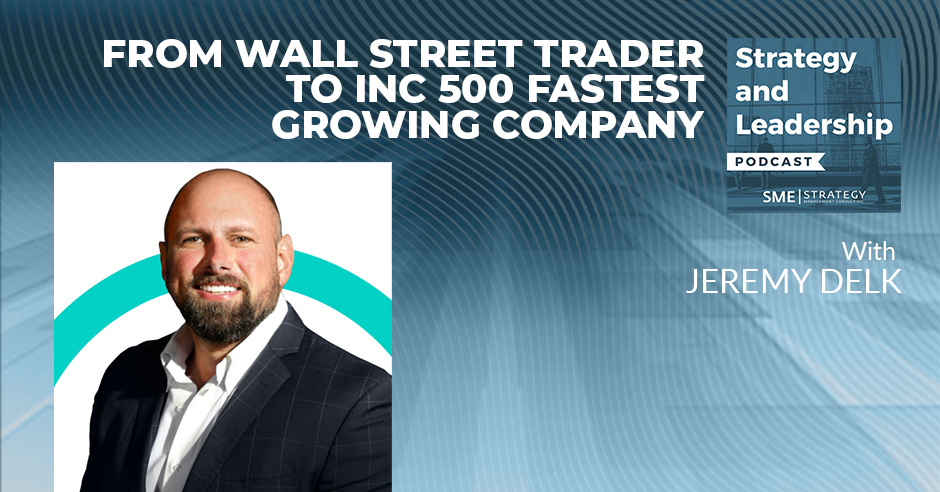
Success is found not in avoiding failure, but in embracing it and learning to rise stronger. Transitioning from Wall Street trader to CEO of an Inc 500 fastest-growing company, Jeremy Delk shares his entrepreneurial journey built on resilience and leadership in this episode. Join us as we explore the twists and turns of Jeremy's life, where he learned valuable lessons from early successes and the heart-wrenching loss of a fortune. Jeremy openly shares his financial setbacks and how he overcame them to build a thriving company, Delk Enterprises. Jeremy was clear on how his entrepreneurial journey wasn’t a straight line to success. As CEO, he gives us a glimpse into the behind-the-scenes realities of running a business and the unglamorous aspects of leadership. From personal resilience to inclusive leadership, Jeremy shares how to ignite your entrepreneurial spirit and set an ultimately stable and thriving culture. Tune in now.
Listen on Spotify: https://open.spotify.com/episode/30hdRbMSxsd4xijL31nPHV?si=adce91fa0b37489d
Listen on Apple Podcasts: https://podcasts.apple.com/ca/podcast/from-wall-street-trader-to-inc-500-fastest-growing-company/id1202449526?i=1000632267208
---
Watch the episode here
Listen to the podcast here
From Wall Street Trader To Inc 500 Fastest Growing Company
The Entrepreneurial Journey Of Jeremy Delk
My guest is Jeremy Delk, who is Managing Director and CEO of Delk Enterprises, and a former Founder and CEO of a successful company and current private equity investor. I'm excited to hear about his stories, his life, what he's learned, and his challenges. Thanks for joining us.
Thanks for having me. I am excited to be here.
Can you tell our readers a little bit about your journey? I tried to sum it up, but why don't you share in your words how you got to where we are now?
I'm a small-town kid from a town called Bardstown, Kentucky, the Bourbon Capital of the World. Growing up in this middle-class upbringing, I had a stable life for the most part. I had this yearning to want to do more, see more and be more. It's led me on a journey that started on Wall Street. I was day trading at a young age. I made a couple of million bucks, but I was before I was nineteen. I blew it all in a few days in a downward market. I've taken a different perspective on life as far as failures go.
We've had 500 companies. We've taken companies, public and private. Those are your CV and report card of how cool I am. What I try and talk about, and I even wrote a book about it, is the behind-the-scenes of how you got there because there are a lot of punches in the face and not pretty stuff. Entrepreneurship is a lonely place sometimes, especially if you're the owner or the founder. You got to pay yourself last and get your people paid. When you're nervous, and you don't have it all figured out, you have to put that stoic face on, like, you've got it.
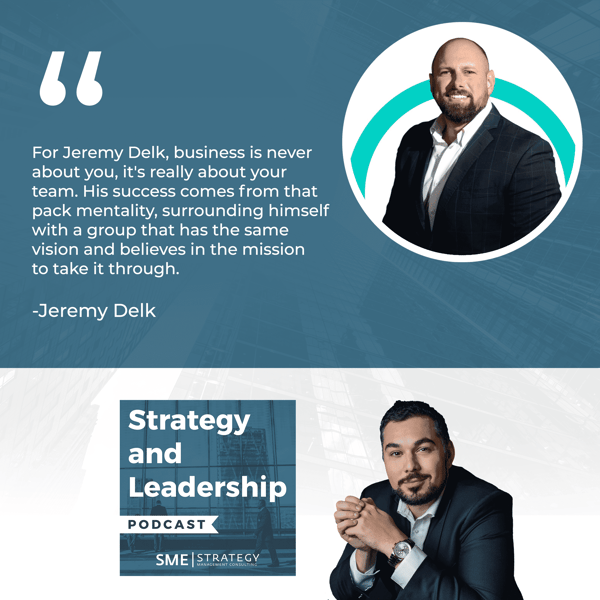
I wanted to share that piece with entrepreneurs. We've been blessed and fortunate. More deals have worked out for us than haven't. The winners have outpaced the losers financially anyway. I have learned a lot along the way. I love to talk about individual stories and different pieces, but people do business with people. We've been successful in a lot of different industries. That's why we're agnostic to any industry because we try to go through, like, “What's the value prop? What's the customer experience in that journey?” You can disrupt that and pattern interrupt. Sometimes, you've got lightning in a bottle.
I want to talk about the challenging parts. You're alone, and you're dealing with it. You pay yourself less. There's a lot of people there. They're coming out, whether that's the downturn in 2019, 2020, or 2021. They are recovering from any changes. Let's focus on the positive. I see a lot of companies as we do their strategic plans. They have the best places to work and are most recognized. They want that prestige thing.
On your bio, you've got a couple of like, “Fastest growing and best companies.” I don't want to ask what the goal was, but more than like, what was the journey of growing? With the level of recognition, some people want recognition. If we were talking to those people, what was the path that led you to being recognized as one of those high-growth and high-impact companies?
We're all vain to a degree. Different people want to admit it. I do business. Money and success are great, but it's a different scorecard that you're competing with. At least for myself, I compete with myself. You're only as good as your last deal, and keep pushing you forward. It's great for that company. We were the 24th fastest-growing company in the US and the fourth fastest healthcare company in the US that year. That was a lot of fun. We took a whole step out there.
We have a big Challenger 300 jet. We had a big week at the black-tie gala and had 100-something employees who felt a part of something. That's cool because, in business, it's never about you, especially owning. It's about your team. I'm okay. I'm smart, but I suck at a lot of stuff. What I'm decently good at is trying to surround myself with people who are much smarter than me and better at a lot of things, but I can hopefully inspire and make them feel part of that team.
That's a big secret of my success. A lot of other successful entrepreneurs are getting that pack mentality where you can surround yourself with a group that has the same vision and believes in your mission to take it through. It's more for them, like, “Look what we did together because it sucks.” With that company, we grew from zero to almost 200 employees. We were pacing into about $50 million in revenue in several years.
That's ugly. I don't care. It's all cool, like those numbers, but you've seen those hockey sticks. Why they don't typically work, and why most people don't invest in them? We fund it ourselves. It's because all the stuff breaks. If you get more customers at this rate, can you keep up? It's a huge task to be able to execute on that revenue.
That was a fun one, but I was trying to share that with the team. You have to. At least, I do. Most entrepreneurs do. We always play these games with ourselves. We’re like, “I wonder if I could do this. I wonder if I could scale this. I wonder if I could buy that company. I wonder if I could do those are the type of games that we set up and scenarios to keep us coming back.
Part of it was a s*** show. Part of it was super fun. The how of it was being acutely aware. I assert at the beginning of the several years. You're like, “Who do I need around the table with me?” That's a big challenge. Whether you're self-funded or external funded, making sure that you have the right team is a challenging thing because sometimes you can only get who you can afford, and you can afford no matter who. It's like the makeup of all of that. How did you make the decisions around how to staff your team, like your exec team, the people around you that were going to lead that growth with you?
.Depending on what stage you are in the business, it doesn't make sense to get seasoned people. Sometimes, you can't afford them, but there are guys that are making $300,000, $400,000, to $500,000 a year. Coming from that corporate environment, they don't work in startups that well unless they're founders themselves. We groom a lot. We try to go and find great people who are dedicated and have a willingness to learn.
Historically, we've always hired a lot of young people. I live in Lexington, Kentucky now. I lived in New York for a while and came back home several years ago. We're surrounded by a huge ecosystem of universities, like the University of Eastern Kentucky and Eastern Kentucky. There are a lot of great schools in Transylvania. Fortunately for me, there are not a lot of great cool jobs. Some of the industries and businesses we have in building are neat.
I have a lot of picks here, where you go to a city like Austin, where competition for employees is much harder. We give back. We try to have cool experiences, go through them, try to listen, make them feel part of something, and invest in them. We are investing in training and sitting in the conferences. Doing that breeds a ton of loyalty for the upper management people. We talked in the green room a little bit about some things that are theories versus doing.
When you've got a company with 5, 10, 20 people, those are small. Those are team and family-like. You can touch everyone as a founder. What happens when you're going to 100 employees or more is even though you're a personal person, like I am, it's impossible to know everyone's name all the time. I suck at names.
It's impossible to always go through where you're not hiring this person. You're not going to be someone who's going to be an assistant manager in the warehouse. You won't ever see that person in the hiring parts. All of a sudden, they're going to come in, be indoctrinated, and they're in your company. What happens as you get bigger is there's this false sense of access. Sometimes, it's not false. Sometimes people are a******. They don't want to deal with people. I like to deal with everyone because I find a lot of value in this.
What I saw when we were this last company with over 100-something employees is things that were happening to me were stupid. That could have been a big problem. They caused this whole internal false. One of them was one star of the staff who wasn't sharing another star of the staff in the break room. It is the dumbest thing you would ever hear of, but it caused actual strife. It was insulated from me because I shouldn't have known about this. When it finally got to me, I was like, “Buy five fridges and be done. “Make everybody happy. This should never even be an issue. Do it.” Sometimes, everyone wants to jockey, like, “What do I do here?” They make a very simple action step way complicated.
What I did to circumvent that is I was like, “Let's give everyone access to me.” Even though it's an open-door policy, some people are scared. They say, “I don't know if I want to sit down with the boss or the owner.” We had our IT guys come up with an encrypted, completely anonymous intranet where they would be able to log in. They could put their name, but they were also not able to put their name if they didn't want to. They could say, “This is my complaint, recommendation, and idea. It applies to this department.” They would go through.
I couldn't address them. The first time we did team meetings. I did one in Moscow when I was over there on business. I did a Zoom recording, and I read them. The first month was stupid. I was like, “Jeremy, why do you always wear Yeezys and a hoodie and not dress up?” A lot of them were dumb things, but I read every one of them. I recorded that and sent it out to the entire team.
You read all of the complaints and feedback.
Everything like, “Jeremy, why are you bald and ugly?” They didn't say that, but you have to because you can't pick, like, “This is the greatest place to work.” You’re like, “Thanks so much, Anthony. We appreciate you.” It can't be BS. I get out there, and I was like, “I'm going to read all of this s***.” After the first two months of some BS, and there were some good things in there, that became such a huge value because now people are like, “This dude is not lying. He's going to listen.”
I take action. I'll go with the break room example, and I was like, “We don't have enough fridges. On this recording, Dana, buy five fucking fridges. Have them delivered next week.” Having that authority to be able to do that and it solves their problem, I'm like, “He can take action.”
*Strategic planning soon? Learn more about our strategic planning services to support your team alignment and focus.
On the converse piece, can I highlight something I think is awesome about what you did? I want to highlight that it takes a little bit of trust and opportunity for people to believe that it's going to happen. Sometimes, they're jaded. They're like, “I talked to my manager. I brought up this fridge issue several months ago. It never happened.” They get apathetic. It takes a couple of times for you to read it that people are like, “He's walking the walk.” It moves forward. I want to highlight that because it's great learning that it takes a little bit for people to believe that it's real.
Otherwise, it kills you because you know what happens. Let's pick on the warehouse. I don't know why we're going to do that. It could be the warehouse manager who we had. He was an a******. He presented to me like Mr. Rogers. I wouldn't know, but it came through like there's smoke and fire. Those people can complain to him and beat him down. If you want to f*** up a good employee, have them manage or be around a s**** employee and have that tolerated. That will f*** your culture.
Conversely, on that point, they always don't know the game either. We had feedback, like, “Why are we doing this going through? I don't agree with it. We should do that.” That's also a valid question and comment. I don't even know your day business, Anthony, but what is in our head is not all, and we assume, this is why I do it all the time when I f*** up, but we think that everyone knows what we're going to do and everyone else we're planning. I don't always know what I plan. I have an idea. You take that for granted. I use those pieces of like, “Do you want to go and do this?”
We're not doing it because Daddy said no. We're not doing it because this is where I want to go, and this is what we're able to do. They respect it. People want to feel heard. You don't have to agree with everything because you can't. I understand that. I know why you would say and think that, but this is why we're going this way. We're thinking so much bigger.
You don't have to agree with everything, because you can't.
On this growing piece, when we were scaling that business, I saw where we were going. My team built their own system to try and go through to get orders because we're fast growing. They built their own system on Excel, and it worked. I knew it wouldn't work forever, and we're going to have to have a solution. We have to come up with software. I'm the guy who said, “We're going to go and use this software.”
It was Salesforce. We did a lot of configuring and spent tons of money on it over time iteratively. For the first several weeks, I would come back down and see Windows shrink. They're doing my system to placate me, but they're still using Excel. I had to be like, “Uninstall Excel. If anyone uses it, you're fired.” I wouldn't necessarily fire them, but you have to trust me on this and do it.
I've sold that company, but they still use the same software. We would've never got to a $50 million run rate on Excel. You have to go through it. Some of that is trust but verified. The more you can be authentic and tell them, “This is what it is.” Even if they don't agree with you, the more that it works out, it builds a lot of trust. I've had my staff tell me to my face, “This is stupid. I don't understand it, but it's going to work. Let's do it.”
They had that appreciation because I'm coming at them that if it doesn't work, take that ownership of like, “That was a f*** up. That's on me.” If you do that, people will respect you. They'll go through and try. That's how you build armies that will go through and be loyal. It's not by paying them money or yelling. You have to build that. It's hard, but you have a culture in every one of your companies. It is good or bad, but you have a culture. It's what you're doing to improve or hurt that culture daily.
I had a strategic planning session with some folks. It's a large, complex organization. There is a lot of stuff going on. The biggest thing that their complaints were past leadership was it felt out of touch. What I like about what you did from a communication planning perspective is that it wasn't manipulative, but it was to get in touch with your people in a way that was scalable. An open-door policy meeting with everybody would not be scalable, but you are able to put their issues on the table.
It's a transparency thing. Some leaders have the belief like, “They're either with us or against us.” It's not that. There's the middle of the unknown. There's a lack of transparency into how decisions get made in the bigger picture because their job isn't to think strategically. You do a sucky job of communicating and informing, not the what. Anybody can inform the what, but the why, the why not, and the process that led to the decision.
If you do that, they're grown men and women. They can get on board because they at least understand the math of how it happened. Not just, “You have to do this. You're going to get fired if we download Excel. No, it's not about that. It's about if we're going to scale and do it successfully, we have to do this.” They can say, “I don't have to like it, but at least I understand the why.”
What I did worked for me. I'm sure there are other ways to do it, but I'm a big personality, as you can imagine, and tough from this show, but sometimes people aren't you. I've walked into rooms with 200 people. I'm like, “This is what we're going to do. If I go through that, what do you think? What did we go through?” No one ever has any criticism because that's not the right venue. They're like, “I'm not going to fucking raise up and go.” It's not the right venue, but meanwhile they could have a relevant thought, idea, or iteration on that piece.
Finding a safe place to extract that is invaluable because your people are everything. They see what you don't see. Small twenty-person teams are still untouched with stuff, but you don't see that you've got a problem. You got someone stealing. You don't have a better way to solve this or a common thread with a customer service issue.
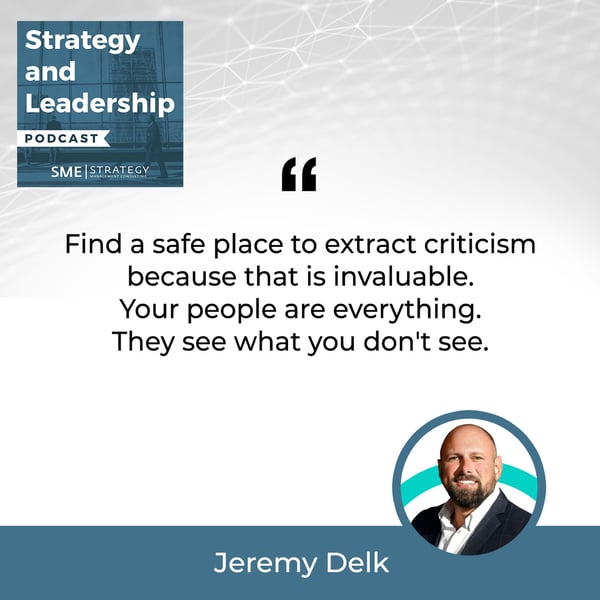
You shouldn't be at that level of granularity. That's good with scale. That's what you want. You want to give your team that ability to say, “ This is what we're seeing. What do we think?” Usually, they have a better idea of what to do about it than YouTube because they're doing it. If you go through and show them that they have a path, it's a cool place to work.
I left my job on Wall Street. This is all in my book, but I blew up $2 million in four days. It’s a s**** job. I ended up getting a dream career as an institutional equity trader for Fidelity Investments. I left my job, thank God. At 21 years old, I started Delk Enterprises. I left not because I didn't love it. I was living in New York City, a single guy in Chelsea. I was killing it. I was doing, but I had ideas, and every idea I had was like, “Keep your head down.” It was shot down.
I figured I could make money doing anything, but it was that creative piece. Because I lost $2 million and I made good again, I had that buck. It can't be that bad. Let's go and do it. That was my courage, and I was able to do it. Many people don't have that same courage. Many people don't go and do it. What they do is become jaded employees, or they go to the next job to pay more money. If you want to create a raving fan tribe, communicate and talk to them.
In the last couple of minutes, we have talked about private equity and your work, like building other businesses. What's that like for you? How is that role different from being in the driver's seat to supporting folks who are in the driver's seat themselves?
I love being creative and building companies. I've done my last startup. I say that and come up with another one. I've got kids. I've got another one on the way. Life catches up. I love the environment. I love going through and doing these podcasts. We have consulting and coaching, but a lot of that helps me with due diligence because with a lot of these companies, we don't consult for, I usually end up investing in.
It's fun for me to still have that semi-active, semi-passive role where you've got an idea, Anthony. You've got all these things. I believe in you as the founder. I can help advise, go through, and get updates because I love solving problems. I love going through, and I love passionate projects. I love seeing success happen and being the person to be able to call when it's all falling apart because I've been there. It gives me some moral pleasure to be able to help and serve that way. It gives me a thrill and excitement to see someone that I'm working with or invested in.
I'm reading the Eleven Rings. He's a successful player and won a bunch of championships. He’s a successful coach and won a bunch of championships. It sounds like you're still on the hunt for a couple more championships on and off the court and family life. I love that. Tell us about your book and where we can connect with you and learn more.
I'm Jeremy S Delk on all socials, Instagram, LinkedIn, and Facebook. The book is called Without a Plan: A Memoir of Unbound Action and Failing My Way to Success. Forbes picked it up as one of the top three business books of the year, which is cool. We were proud of that. It's everywhere you would find books, Barnes & Noble, Amazon, and Audible.
Audible is Cool. I stole a page out of David Goggin's book. We had a professional narrator do all the reading of the book, but there was almost a podcast interview where I sat down with him at the end of each chapter to give some behind-the-scenes stuff. I got a lot of good feedback about it. There is a lot of great business stuff and seismic great rises, but I got personal because I think business is personal.
Business is personal.
That's where I've got most of the feedback. It’s like, “Thank you for being vulnerable. Thank you for showing that.” It's okay not to have all the answers. Most of the time, you don't. As long as you've got that faith to keep moving forward, changing your perspective on failure and getting started with whatever that is, buying the company, starting the venture, or asking the girl to marry you, take that step forward and see what happens.
You might end up where you are now. There's a tool quote that I want to share. It was said, “Ride the spiral to the end. You may go where no one's been.” It is a slightly abridged version. Jeremy, thanks for being on the show. Thanks for chatting and being who you are. You are vulnerable. It's rock and roll. The folks that set us up said, “You guys are going to get along like a house on fire.” I didn't drop as many swear words as I might, but now I understand why they thought we'd get along. Jeremy, I appreciate you. Thanks for being here.
My guest is Jeremy Delk, who is the Managing Director and CEO of Delk Enterprises. One of the things that took away for you leaders, and especially CEOs, is to provide a platform for your people to feel safe for, but also to contribute to the company in a way that meets them where they're at. If you can do that, you're going to have tremendous buy-in. If you want to grow, have a great culture, and have great success, it'll likely lead to that.
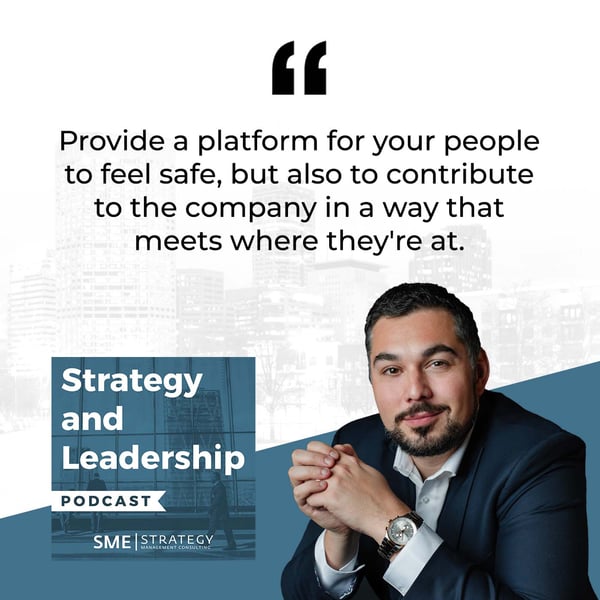
Provide an opportunity, a two-way street for your team. Walk the walk. Inform them where they're going and help them get there. On a personal basis, you are a person who is in a company. You are not a company. Take that in with your day. It has to be a great one. Jeremy Delk, thank you again for joining us. I'll see you next time.
Important Links
- Delk Enterprises
- Salesforce
- Eleven Rings
- Instagram - Jeremy Delk
- LinkedIn - Jeremy Delk
- Facebook - Jeremy Delk
- Without a Plan: A Memoir of Unbound Action and Failing My Way to Success
About Jeremy Delk
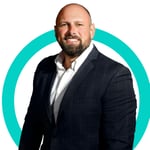
Delk Enterprises has grown from making $6,000 in its first year in business to a diversified VC fund that has built and exited investments in both private and public transactions. Today, more than 20 years later, Delk Enterprises has holdings in biotech & healthcare, consumer brands, technology, building materials, and real estate development.
Jeremy now focuses on investing in and advising entrepreneurs through speaking. His upcoming book shares his reality of the Good, Bad, and UGLY of entrepreneurship. It serves as a not-so-subtle reminder of fundamental principles he’s learned through his journey: while great times don’t last forever, neither do the truly bad ones.


